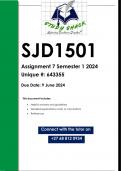Exam (elaborations)
SJD1501 Assignment 7 (QUALITY ANSWERS) Semester 1 2024
- Institution
- University Of South Africa (Unisa)
This document contains workings, explanations and solutions to the SJD1501 Assignment 7 (QUALITY ANSWERS) Semester 1 2024. For assistance call or us on 0.6.8..8.1.2..0.9.3.4........ 1. In the case of H v W, Judge Nigel Willis had this to say "...The law has to take into account changing realities ...
[Show more]




